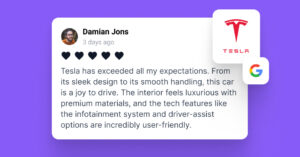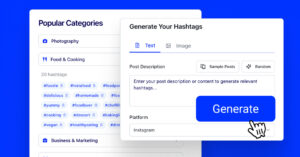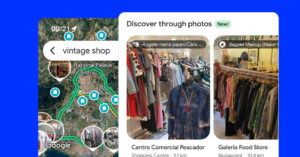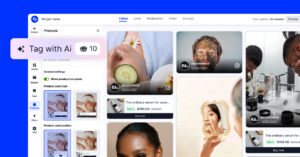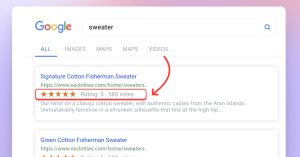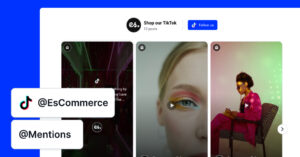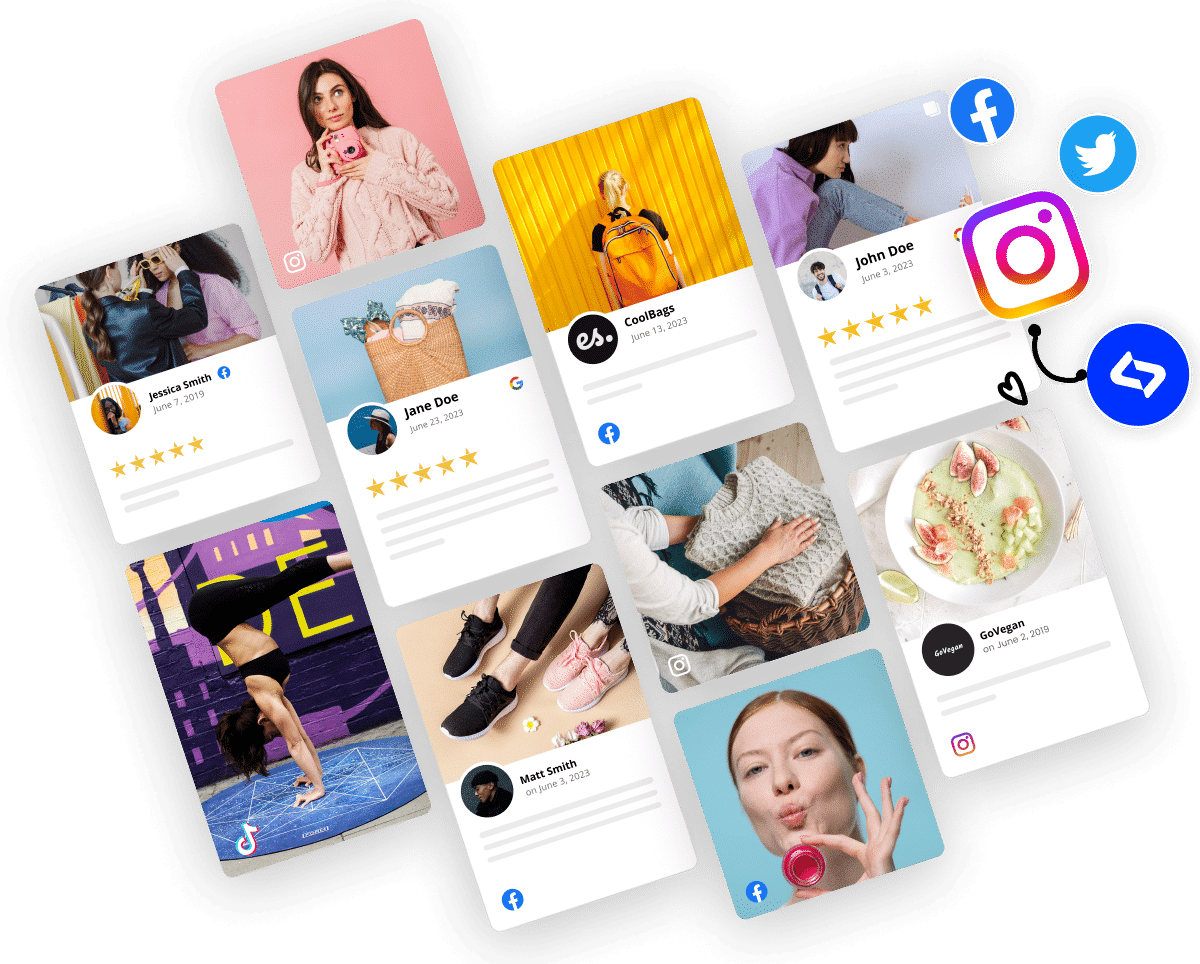Social proof is the secret weapon modern businesses use to convert potential leads, even if they are coming across the brand and its products for the first time.
But, what is it exactly and how does it work? In short, social proof is the main driving force behind consumers’ choice in purchasing one product over the other.
Namely, we all tend to go for the most praised option since our peers have good things to say about everything from its affordability to its performance.
So, if you want to learn more about how social proof subtly guides us through the consumer decision-making process, keep on reading below.
I’ll reveal to you the secrets of social proofing and share over 20 practical social proof examples of how to use it to increase your conversion rates.
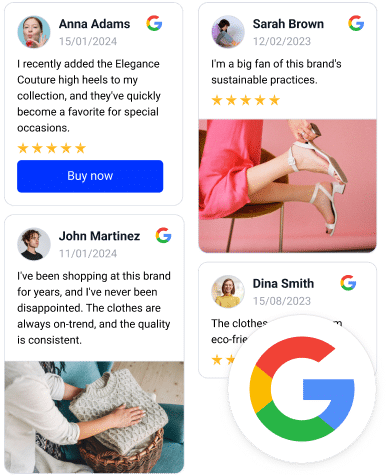
Embed Google Reviews Widget like a PRO
Automatically collect and embed Google reviews and use AI reviews management tools to unlock your website’s sales potential.
FYI: You can automatically embed Google reviews widget on your website and show authentic user-generated reviews, increasing trust for more sales. Try it now.
What is social proof?
Social proof is a psychological phenomenon that indicates that customers form opinions and make decisions based on other people’s actions. In marketing, and especially advertising, social proof is a form of product or service referral from social media influencers, industry experts, or actual customers that helps you gain new customers.
‘Social proof’ meaning
The most common types of social proof are reviews and endorsements, industry expert opinions, influencer campaigns, customer success stories, and content created outside your brand, all of which add weight to your product’s value and can be the difference between a conversion and an abandoned cart.
Ultimately, potential consumers are more likely to trust online reviews from other consumers rather than you since you have a vested interest in making a sale.
Therefore, intelligent uses of social proof are great for increasing conversions and gaining loyal customers since they are not based on self-praise.
Why is social proof important for marketers?
Leveraging a social proof marketing strategy significantly amplifies your brand’s credibility and customer engagement for several reasons:
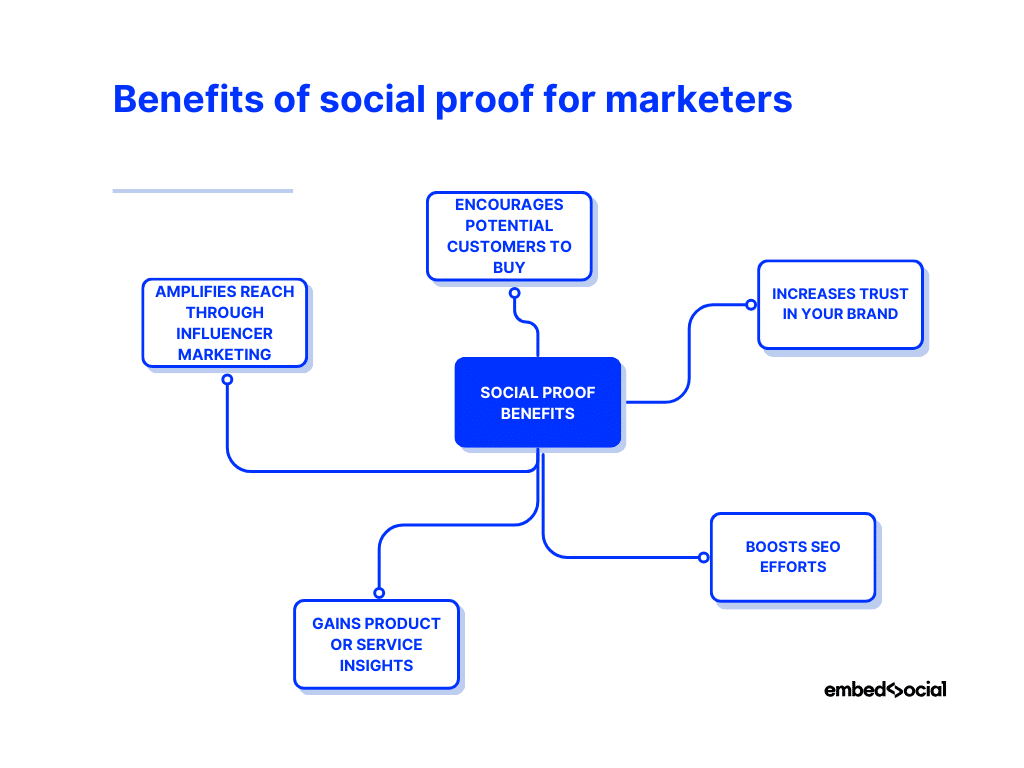
- Encourages potential customers to buy—when buyers see existing customers vouching for your product or service, they are more likely to make a purchase;
- Increases trust in your brand—testimonials, reviews, and user-generated content can all serve as trust signals. When people see that others are satisfied with your brand, they gain the knowledge they need to trust you themselves;
- Boosts SEO efforts—user-generated content often includes valuable keywords that will help your site rank higher in search engine results;
- Gains product or service insights—social evidence isn’t just about marketing; it’s also a valuable source of feedback. After all, customer reviews and testimonials can provide insights into what’s working and what needs improvement;
- Amplifies reach through influencer marketing—influencers exponentially increase your brand’s visibility when endorsing you as their audience trusts them.
To back up these claims, I’ve collected a few recent statistics:
- 95% of customers check product reviews when shopping online.
- 93% of marketers agree that consumer-created content performs best.
- Positive reviews encourage customers to spend 31% more.
- 86% of companies today use UGC as a part of their digital marketing strategy.
Now that you know what is social proof in marketing and how effective it is, let’s see just how it works.
Social proof psychology: How does it work?
Social proof operates on a fundamental psychological principle—humans have an innate need for social validation.
When we observe others engaging in specific actions or making decisions, we tend to interpret these behaviors as correct or desirable, so in search for social validation, we adapt our decisions to reduce the uncertainty in our own choices.
Furthermore, we abide by a couple of cognitive biases that strengthen the impact of social proof in the decision-making process:
- The bandwagon effect—occurs when we adopt our behavior because we see others doing something we believe is better.
- Informational social influence—takes place when we use the actions of others as a source of the information we lack.
Another key aspect of social proof is its ability to reduce uncertainty. When we face complex decisions or feel unsure, observing the choices of others provides a mental shortcut, allowing us to feel more secure in our decisions, as we trust that others have the knowledge or experience we lack.
Lastly, the fear of missing out (FOMO) amplifies the influence of social proof by creating a sense of urgency and exclusivity. When we see others benefiting from limited-time offers, exclusive deals, or social experiences, we are driven to take action to avoid being left behind.
Ultimately, social proof and FOMO work together to drive behavior, build credibility, and create a sense of belonging. By understanding these psychological principles, businesses can effectively use social proof to encourage customer engagement, increase conversions, and build trust.
FYI: You can automatically embed Google reviews widget on your website and show authentic user-generated reviews, increasing trust for more sales. Try it now.
21 types and examples of social proof for marketing
Not sure where to start? Check out these common types of social proof:
- Reviews and customer testimonials
- Case studies
- Affiliate promotions
- Celebrity social proof
- UGC (user-generated content)
- Expert recommendations
- Certifications
- Real-time or recent activity
- Influencer endorsements
- Media mentions
- Certifications and badges
- Client logos
- Number of customers or users
- Before-and-after demonstrations
- Test scores
- Customer video testimonials and references
- Real-time stats
- Community engagement
- Awards and recognitions
- Positive social impact
- Social media followers and shares
1. Reviews and customer testimonials
Online reviews and customer testimonials are the most obvious and probably the most sought-after type of social proof, as people rely on them for an honest and realistic impression of your product/service that they can’t get from your own words.
For example, if you sell real estate agent software, there’s only so much you can do via your website to convince new customers to buy.
But, having a review collection strategy for people who have used your software is vital to assure prospective buyers that your product is useful.
There are many ways to use testimonials in your content. Some brands create a dedicated landing page for them, while others pepper them throughout their site. Some, like Casper below, have a carousel featured prominently on their homepage, which site visitors can scroll through to browse a range of reviews:
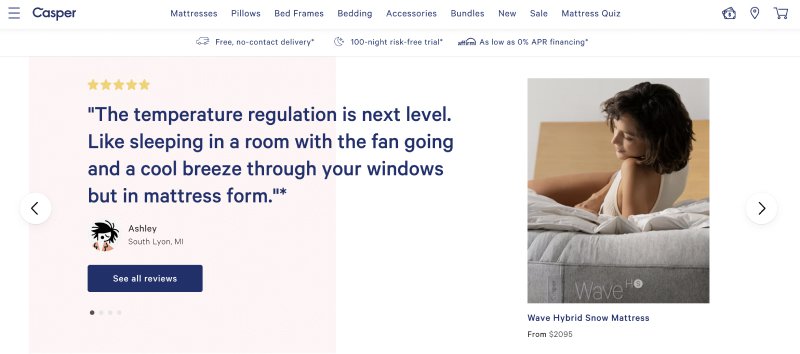
Oh – one last point! Don’t feel like all your reviews have to be positive. Three-star reviews are often more valuable than five-star reviews. Why? Because too many five-star reviews feel ‘too good to be true.
Three-star reviews, however, are considered more ‘balanced’ and still can provide positive feedback about your brand and may refer to some other attributes in your business that you need to improve.
People trust them more than stellar reviews, assuming there’s nothing terrible in them, and folks will often buy based on them.
So don’t worry if your reviews aren’t universally awesome! A balanced mix of reviews is often better than an overwhelmingly positive skew.
Plus, to make the most out of them, ensure you are using a reviews management platform to make your customers happy managing negative reviews, as they are the main reason for shoppers abandoning their carts:
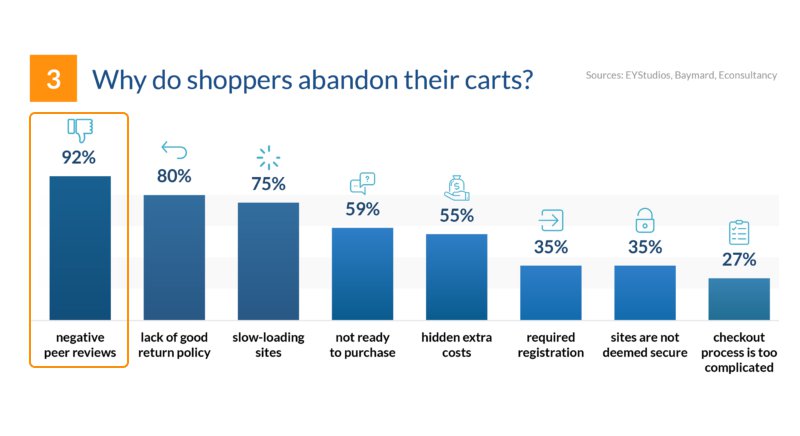
2. Case studies
If you fill your blog and possibly a dedicated section of your website with case studies from happy customers, your conversion rate will thank you.
When they’re at the “research phase” of their buying journey, customers want to know how your product improves their lives. Success stories help with this.
A good case study acts like an extended customer review over which you have some control. Reach out to your best customers and ask if they’d mind answering a few questions for a case study. Chances are, they’ll be delighted to help you out and get the extra exposure your case study will provide.
You can then embed these studies on your website—a dedicated page on your site will satisfy those individuals who search specifically for this kind of social evidence. You don’t have to limit the impact of case studies to those prospects, though.
Take, for example, this glossary page on hosted VoIP. It’s designed to provide useful information for visitors who are interested in those kinds of solutions and think they might benefit their business.
We also utilize social evidence in the form of vignettes from and links to case studies of how those exact products have helped others:
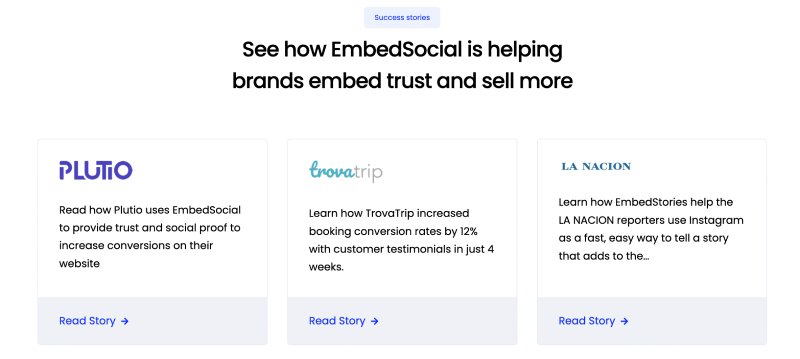
3. Affiliate promotions
Affiliate marketing involves a third party, such as a blogger, a website owner, or a content creator putting your product in front of its target audience.
Affiliate promoters are paid a commission per conversion, but they still have a choice about which products to recommend. In the public eye, this makes them more trustworthy than brands, as they tend to blog about products they genuinely like.
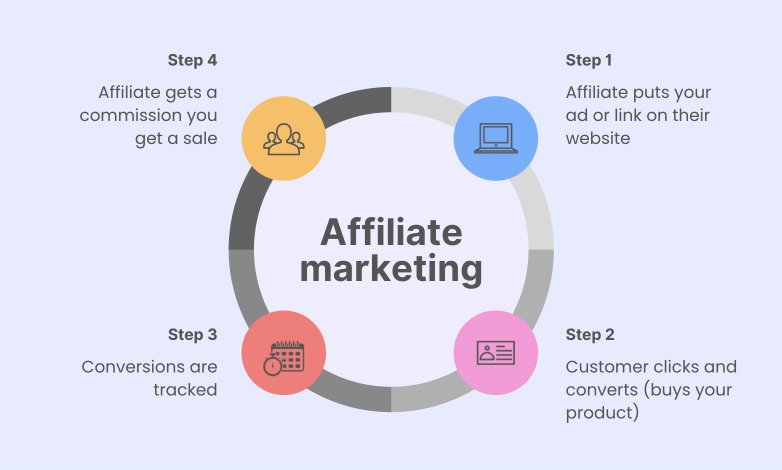
When it comes to affiliate marketing, remember how important the feeling of trustworthiness and authenticity is to potential consumers. So, try to be discerning when selecting affiliate partners, and only work with those who have used and loved your products. That genuine care for your products and brands will shine through to their readers or followers.
Their readers or followers will then be much more inclined to follow affiliate links to your website and product pages. Pre-primed with a glowing endorsement of your brand from someone they trust, they’ll be more likely to make a purchase, sign up for your service, or get in touch. That’s where affiliate promotions start to maximize the potential of your site.
4. Celebrity social proof
Celebrities and influencers already have an audience, and if they’re any good at what they do, a positive relationship with that audience.
If you pick your celeb/influencer well, you can leverage their social followers and relationships to your advantage.
Nowadays, when a celebrity endorses a brand in an Instagram post, for example, it’s like making personal recommendations. This is very common because celebrities want to be sure of the value of a product before they promote it on their public social media profiles.
The audiobook brand Audible is a great example to study in general if you want to know how to use any social proof ads, but they’re particularly fantastic at influencer and celebrity endorsement.
It has become the world’s number one audiobook streamer by offering prominent YouTubers and podcasters sponsorship in exchange for a quick signal boost:

When choosing this route, it’s worth understanding the differences between B2B and B2C marketing. Typically, celebrity and influencer marketing works best for B2C businesses, and as for B2B marketing, you might be better off with expert recommendations (more on those later).
That’s because B2C marketing is often more about eliciting an emotional response from prospects, and seeing a favorite celeb promoting a product can do that. B2B marketing is more about reason, logic, and persuasion. However, this does depend a lot on the nature of your business!
5. UGC (user-generated content)
If you can get UGC (user-generated content) right, you’re onto a winner. Using your customers’ own brand-related content as social Influence is a fantastic way to build trust, build community, and drive conversions.
The dog brand BarkBox is incredible at UGC. They regularly post their users’ photos, memes, videos, and more. This not only gives them a constant stream of great content, but it also drives up their organic reach as users share ‘their’ BarkBox posts to their own socials.
If you do something like BarkBox and do UGC right, everybody wins. BarkBox gets genuine, organic UGC that works as fantastic proof; the user who generated the content gets a signal boost, and everyone’s organic reach is improved.
Perhaps best of all, BarkBox shows authentic users enjoying their content. This builds trust, helps them to engage with their user base, and creates a great sense of community around their product:

Where does maximizing the potential of your website come in?
Good question. The answer is in two parts. Firstly, you can link and direct social media followers to your site directly from threads, including posts using UGC. Second, growing your social media following by interacting with and utilizing UGC can boost traffic to your website.
After all, the kind of community it creates will boost your brand awareness. That can, in turn, enhance branded traffic to your site, and that’s something search engines notice when ranking your pages.
Including such elements on your site isn’t complicated, either. Any business can embed a Twitter carousel linked to their hashtags on their pages to provide social proof from Tweets shared by actual customers.
6. Expert recommendations
Of all social influence examples, industry expert advice, testimonies, and recommendations are the hardest to come by.
For a start, your product needs to be relevant to the expert’s field for their testimony to work. There is no point in getting a creative writing professor to talk about how much they love your brand of socks. Well, not unless they’ve written a great book about socks at some point in their career.
Expert testimony is particularly useful in B2B marketing. Having a respected industry figure coming out in favor of your product will work wonders for your brand.
In-depth expert testimony won’t be offered unless your product is fantastic. After all, experts have a reputation to maintain and won’t lend their authority to anything that doesn’t meet their approval.
However, if you impress an expert, publicizing and sharing their help will impress your existing customers and those website visitors that you’re looking to convert.
Here is an example of an expert recommending products: Dr.Huberman has partnered with Momentus supplements, and on their website, you can find a full section of Huberman Kit of products recommended by him:
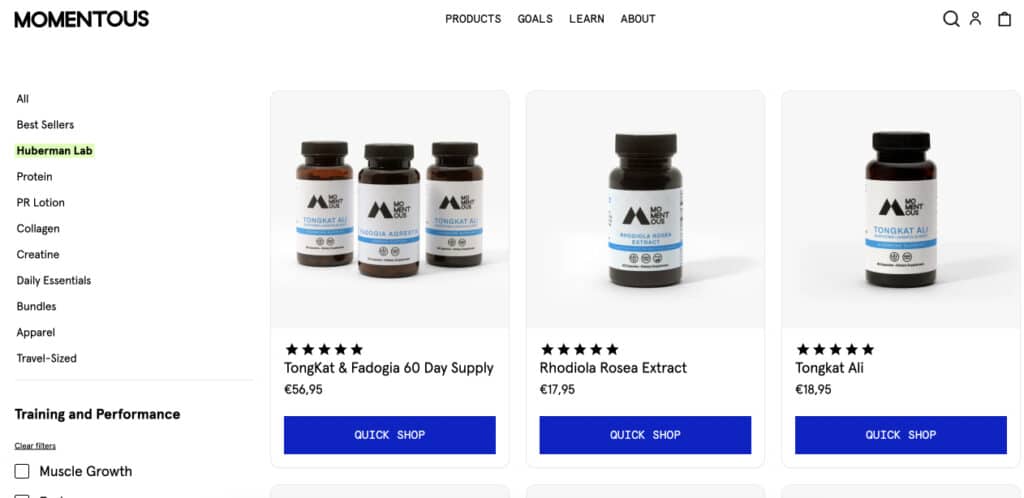
7. Certifications
Social proof serves to cement trust between the brand and the customer. They say, ‘This product is good. Here’s a second opinion that proves it. But social proof doesn’t always have to come from customers.
Certifications also serve as third-party affirmations. Customers know that you have to fulfill certain criteria to get a certificate, so displaying that certificate is very reassuring.
Things like a certification of ISO compliance, food safety, and hygiene certificates, security verifications, academic qualifications, association memberships, and guild memberships…all serve as valuable social proof showing your business to be valid, trustworthy, and legitimate.
Don’t be shy of showing off the certifications your business has achieved or the compliance standards you meet. For example, in a recent blog post on free video conferencing tools, we chose to draw attention to our GDPR and SOC2 compliance:
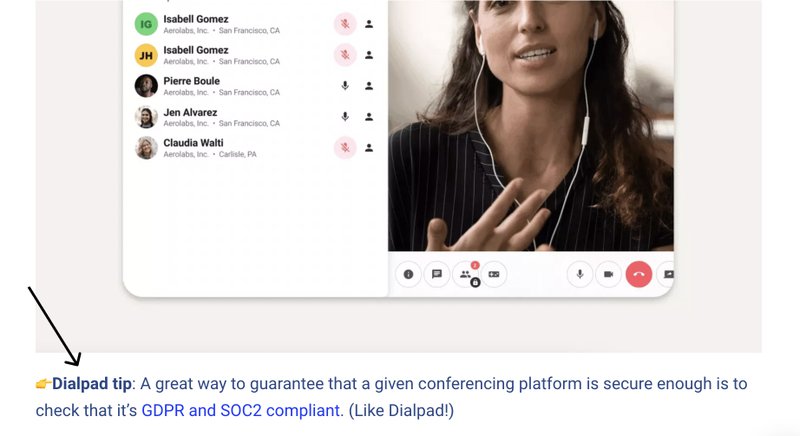
It’s a potential point of difference between ourselves and some rivals. And, like all these examples of social proof, it is a way to build more trust with site visitors. It’s only visitors who trust you, after all, that you may be able to turn into customers.
8. Real-time or recent activity
By showcasing real-time or recent activity on websites and apps, businesses create a sense of urgency and trust that significantly influences users’ decisions.
The dynamic display of purchases, sign-ups, or interactions instills a fear of missing out and validates the popularity of a product or service, compelling users to follow suit and take immediate action.
For example, Udemy has currently put what students are viewing on their websites:

9. Influencer endorsements
Influencers hold remarkable power when it comes to shaping consumer behavior. Their ability to build a loyal following and establish credibility makes their endorsements highly influential.
Influencers tap into their followers’ trust and admiration by aligning their personal brand with a product or service. When an influencer promotes a particular brand or recommends a product, their audience is more likely to perceive it as authentic and trustworthy. This endorsement has the potential to sway consumer decisions, driving them to engage with and make purchases based on the influencer’s recommendation.
The skin care company Cerave has partnered with Charli D’Amelio, one of the top influencers for TikTok UGC campaigns, reaching a whole new audience through D’Amelio’s account:

10. Media mentions
Media coverage is another great way to establish credibility and social proof as a business. When a company receives positive mentions in the media, it gains visibility and validation in the eyes of the public. Such coverage serves as a stamp of approval, signaling that the business is reputable and trustworthy.
A scenario where a business garners positive media mentions increases its brand recognition and bolsters its social proof, influencing consumers to view it as a reliable and noteworthy choice.
Check out celebrity trainer Kit Rich’s website, for example:
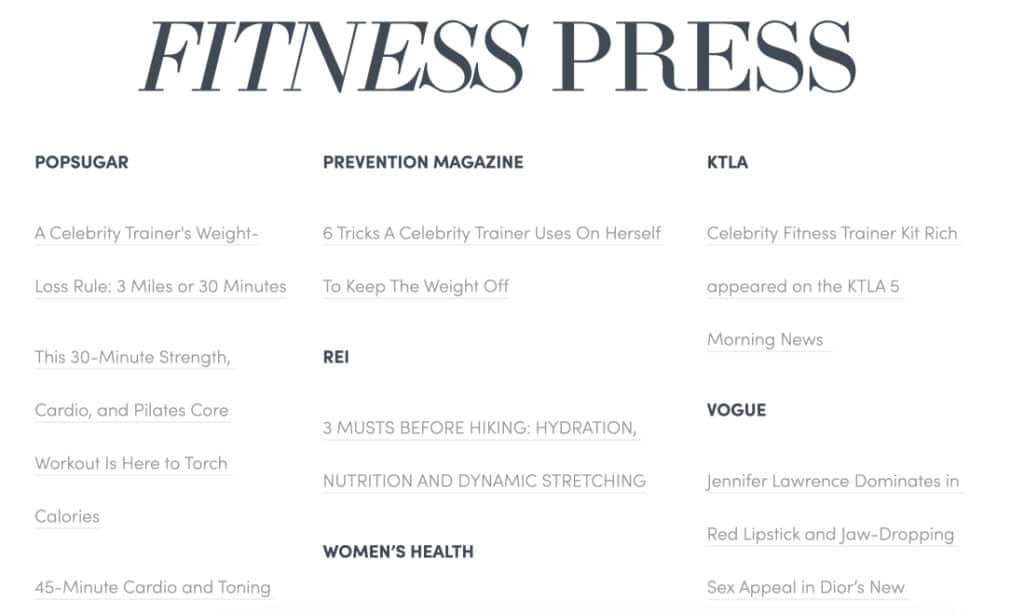
11. Certifications and badges
Displaying certifications and badges enhances trust and social proof by providing tangible evidence of a company’s credibility. When a business showcases relevant certifications, such as security certifications for a software company, it instills confidence in potential consumers.
By demonstrating compliance with industry standards and best practices, these certifications validate the company’s commitment to security, fostering trust and reassurance. This, in turn, influences customer perceptions, as they feel more confident in choosing a company that has recognized certifications.
Just take a look at this example from Athletic Greens:

12. Client logos
Using well-known client logos as a form of social proof is another powerful strategy to build trust and credibility. When a service provider prominently displays logos of reputable clients, it conveys that these established brands have placed their trust in the provider’s services.
This visual social proof enhances the service provider’s credibility, as potential consumers perceive that if respected companies have chosen them, they too can rely on their expertise and quality.
Here’s an example from Notion’s website, where you can see big names using their platform, like Figma, Toyota, uber, Pinterest, Amazon, Nike etc.:
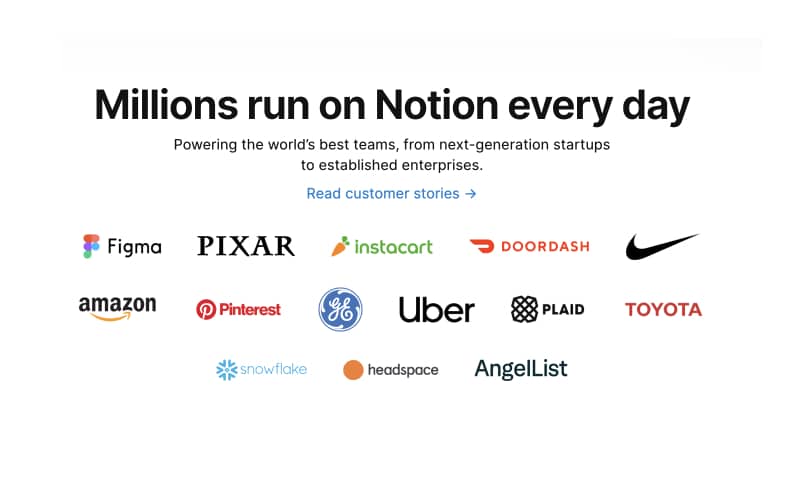
13. Number of customers or users
By showcasing a large customer base, a subscription-based service, for instance, creates a perception of trust and desirability.
When potential customers see that a significant number of users have already subscribed, it reinforces the notion that the service is valuable and worth signing up for. This social proof encourages new sign-ups, as people are more inclined to trust a service with a substantial user base.
Here is an example user social proof, with a rating badge with user photos and the number of users on the EmbedSocial platform:
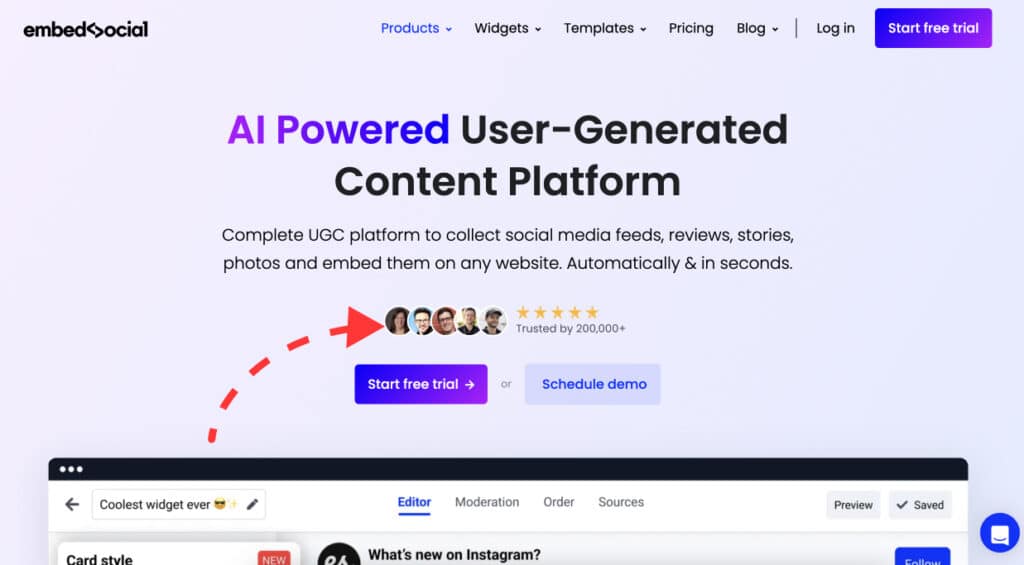
14. Before-and-after demonstrations
Before-and-after demonstrations are highly effective in various industries as they visually showcase a product’s or service’s transformative power.
In the fitness industry, for example, a product displaying impressive transformations captures the attention of potential customers and convinces them of its efficacy.
By presenting tangible evidence of the desired outcomes, before-and-after demonstrations serve as compelling social evidence, demonstrating the potential benefits and motivating individuals to engage with the product or service.
Here is an example of the before-and-after social proof section on the website of a dental care clinic:
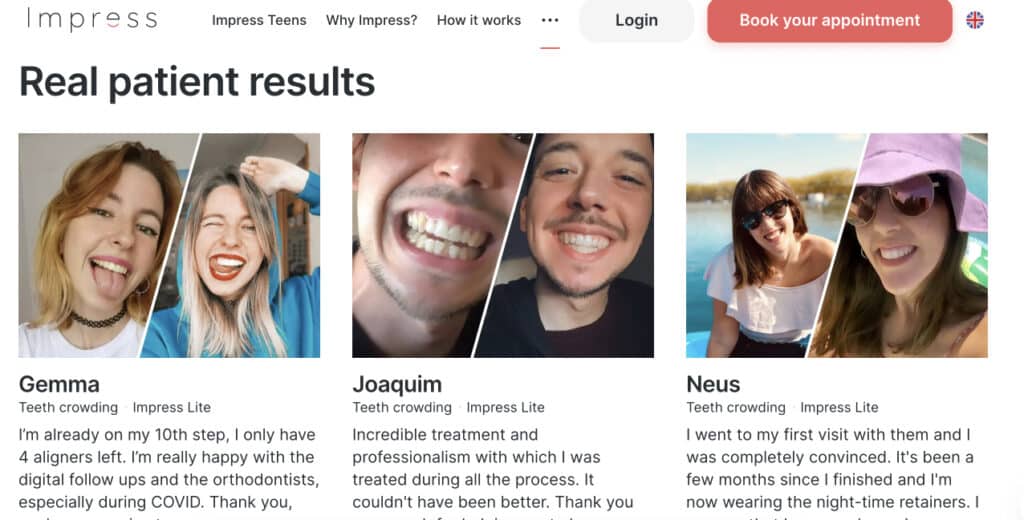
15. Test scores
Displaying test scores or ratings can significantly influence decision-making. In the realm of education, an educational platform showcasing high test scores attracts new users by demonstrating its effectiveness.
By highlighting impressive scores and ratings, the platform establishes credibility and social proof, assuring potential users of its ability to deliver positive outcomes. These test scores serve as a powerful motivator, enticing individuals to join and benefit from the platform’s proven track record of success.
Here’s how to use test scores as a social proof example on your website:

16. Customer video testimonials and references
Picture a hotel website that features positive guest reviews – it encourages bookings by instilling confidence in potential guests.
By showcasing authentic experiences and satisfaction, these customer references validate the hotel’s quality and service.
Prospective guests are more likely to trust the opinions of fellow customers, making these testimonials a persuasive tool in influencing their decision to book a stay.
On top of this, examples of customer preferences in video testimonials are one of the most powerful ways to showcase social proof on your website:
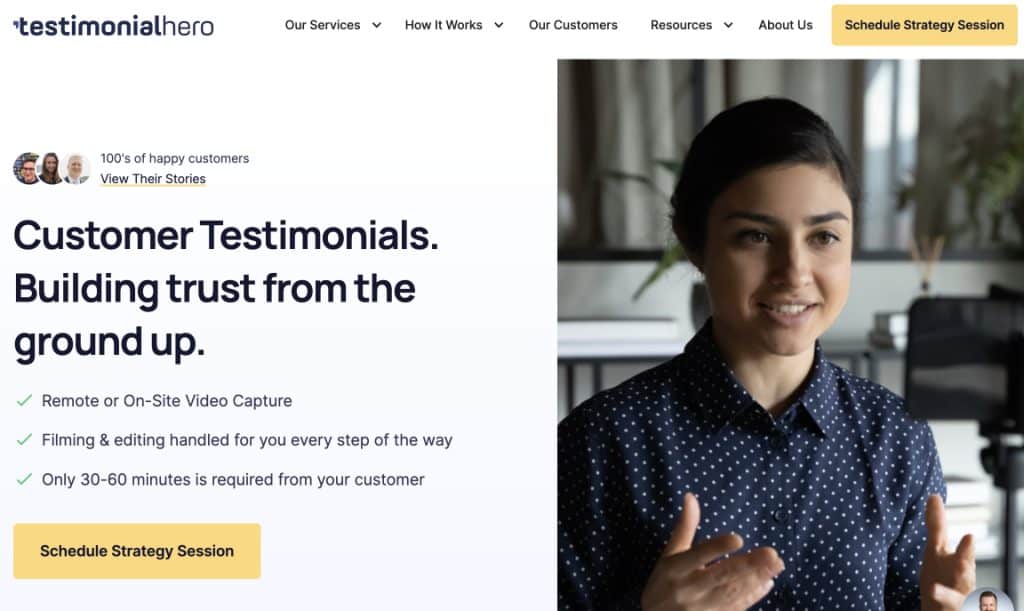
17. Real-time stats
Real-time stats are a powerful tool for creating urgency and credibility. For instance, an e-commerce website displaying the number of items sold in real time generates a compelling sense of urgency for potential customers.
Seeing the live updates of items being purchased instills the fear of missing out and validates the popularity and demand for the product. This social proof encourages visitors to make a purchase fast, driven by the wish to be part of a trending item:

18. Community engagement
For example, a social media platform highlighting active user engagement attracts new users by showcasing vibrant interactions and discussions. Demonstrating a lively community fosters a sense of belonging and credibility, encouraging potential users to join and participate.
This social proof emphasizes the platform’s value and affirms its relevance, making it an appealing choice for individuals seeking an engaging online community.
Just take a look at the homepage created by the AI content generator Jasper. They showcased the power of their community with 100,000+ users and its value in providing evidence of the platform’s success:

19. Awards and recognitions
For instance, a restaurant showcasing its prestigious culinary awards attracts diners by reinforcing its reputation for excellence. These accolades symbolize expertise and quality, instilling confidence in potential diners.
By prominently featuring such awards, the restaurant establishes itself as a trusted choice among discerning customers, leveraging social proof to attract individuals seeking an exceptional dining experience.
Talking of restaurants, what better achievement than not 1 but 3 Michelin stars to display on your website?

20. Positive social impact
Highlighting positive social impact is another great example of social proof. For example, a sustainable fashion brand showcasing its environmentally friendly practices appeals to conscious consumers.
The brand establishes itself as a responsible choice by emphasizing its commitment to sustainability, such as using eco-friendly materials and ethical production.
This social proof aligns with the values of conscious consumers, making the brand more appealing and trustworthy in their eyes:
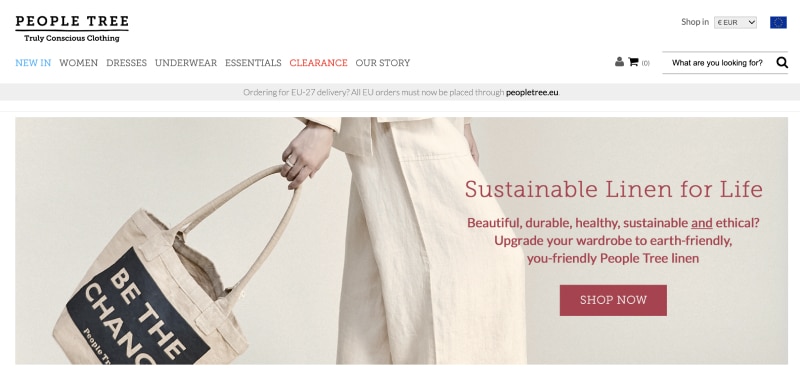
21. Social media followers and shares
Social media followers and shares are great indicators of popularity. When a brand boasts a large social media following and numerous shares, it signifies widespread interest and engagement.
This increased visibility enhances brand awareness as the content reaches a broader audience through shares, ultimately strengthening its social proof. A brand with a significant social media presence enjoys heightened credibility and appeal, influencing potential customers to engage with and trust the brand.
Check out how many followers Hubspot has:

How to collect social proof from social media platforms?
Having social media posts about your brand published by satisfied customers is a gold mine when looking to build social proof widgets for your website.
Well, the best way to collect social proof is by using API-approved social media aggregators like EmbedSocial:
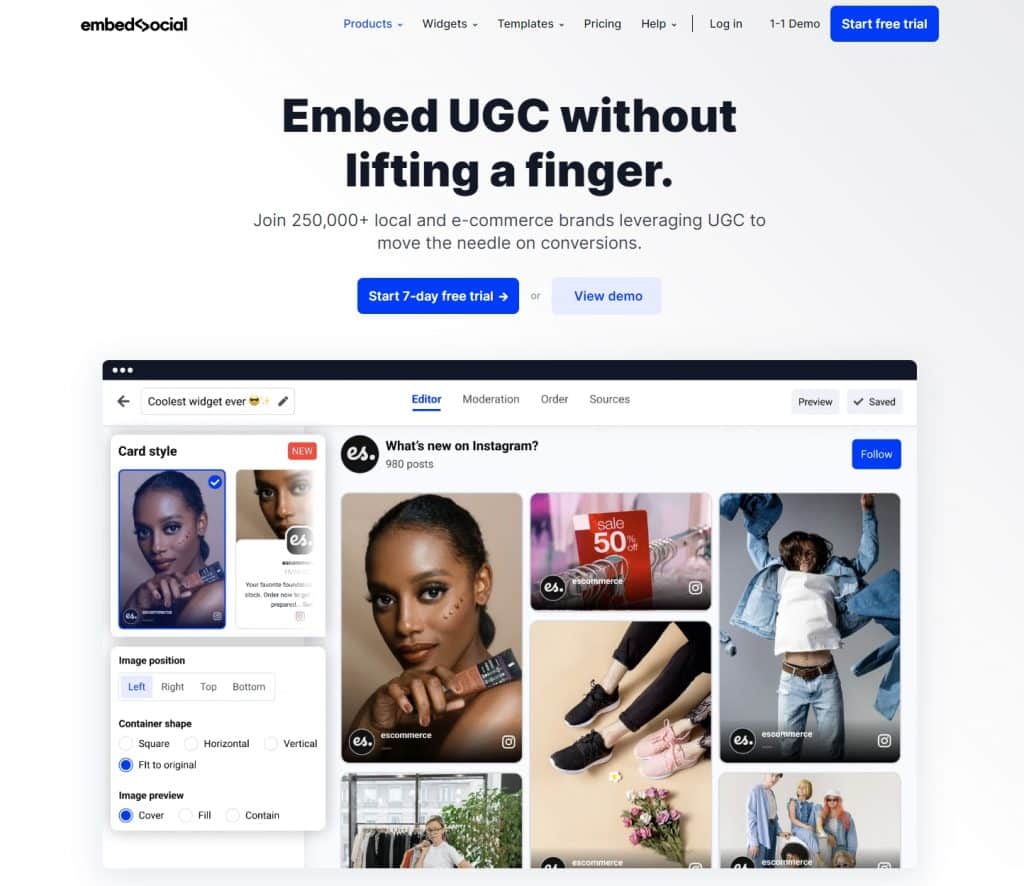
This and other similar platforms can collect and embed all social media posts containing your product published by actual customers.
Best of all, it works with every major social media platform and provides a variety of embeddable widgets for websites for all the user-generated content you get.
EmbedSocial’s solutions are perfect for getting UGC for eCommerce brands operating in a competitive industry where direct relationships make all the difference.
Steps to create a free social proof widget
Social proof widgets are embeddable, interactive elements for your website that show content your customers share in a review or UGC format.
You can include everything from Google reviews and Instagram mentions to newsletter subscriptions, purchases, or similar.
Let me show you how to create a widget that appears at the bottom of your website and includes your Google reviews rating and links to your Google location.
This Google reviews badge is free and updates each time you get a new review:
- Enter your Google location in the empty field below;
- Tap on ‘Generate‘ to create your free reviews badge;
- Register for a free EmbedSocial account to get the code;
- Copy and paste the provided into your website.
That’s it. The widget will appear on your page and update automatically.
To build more complex Google reviews widgets, you will need to upgrade to a premium account.
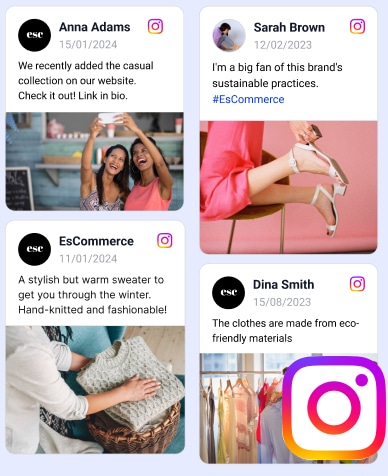
Display social media wall on your website automatically!
Try our Social media aggregator and display Instagram, Facebook, YouTube, Pinterest, TikTok, and LinkedIn feeds on your website in seconds.
Conclusion: Harness the power of social proof right away!
Social proof is an invaluable asset for businesses looking to build credibility and influence buyers. By showcasing customer feedback testimonials, reviews, and endorsements, you establish trust and legitimacy with potential customers.
Building a social proof website through UGC and real-time activity can drive engagement and increase conversions, as it’s a proven way to demonstrate that your brand is trusted by others, which in turn, motivates new customers to follow suit.
Remember: the more you use social proof effectively, the stronger your brand’s credibility and success will grow, and there are plenty of ways you can do that, from collecting UGC from your customers to community engagement. That said, remember to sign up with a social proof tool like EmbedSocial to make the most out of it.
So take a look at all the social proof advertising examples I outlined above to get inspired to create your own cost-effective marketing strategy. At the end of the day, these social proof marketing examples are among the best out there!
FAQs about ‘social proof’
What do you mean by social proof?
Social proof is a concept in which people are influenced by the behavior or opinions of others, often used in marketing to build trust. By showcasing how others perceive or use a product, businesses can increase credibility and encourage potential buyers.
What is another term for social proof?
Another term for social proof is “social influence,” which highlights how individuals’ decisions are shaped by observing others’ actions. This influence is used in marketing to guide potential customers by showcasing others’ positive feedback or experiences.
Why is social proof important?
Social proof is important because it influences people’s decisions and behaviors. When people see others using a product or service, they are more likely to trust the brand and try it themselves. It’s a powerful tool for building trust and credibility.
What is a social proof example?
Examples of social proof include customer testimonials, online reviews, social media shares, celebrity endorsements, and case studies, all of which prove a product’s or service’s value.
How does social proof work in marketing?
In social proof advertising and marketing, this concept shows potential customers that others trust and value a product or service. This can be done through testimonials, reviews, endorsements, and more. It helps build trust and credibility, making people more likely to purchase.
How can I use social proof in my business?
You can use social proof in your business by collecting and showcasing testimonials, reviews, endorsements, and case studies. You can also leverage social media to show how many people use and talk about your product or service.

